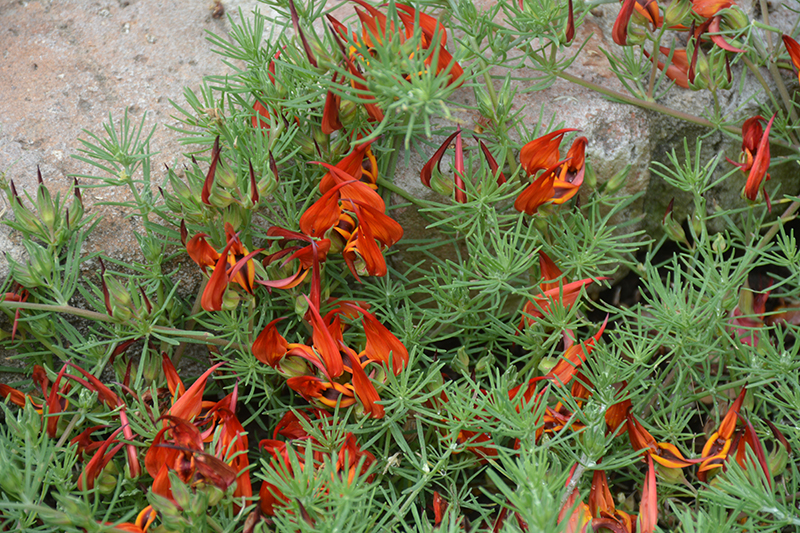Height: 8 inches
Spacing: 24 inches
Sunlight:
![]()
![]()
Hardiness Zone: (annual)
Description:
Stunning scarlet and gold flowers bloom on this spreading and cascading plant only when night temperatures are cool; otherwise it is a great silvery-green foliage base for containers and baskets, and a fine groundcover for the garden
Ornamental Features
Parrots Beak features showy scarlet pea-like flowers with gold streaks along the stems from mid spring to early summer. Its attractive small needle-like leaves remain grayish green in colour with hints of silver throughout the season.
Landscape Attributes
Parrots Beak is an herbaceous annual with a trailing habit of growth, eventually spilling over the edges of hanging baskets and containers. It brings an extremely fine and delicate texture to the garden composition and should be used to full effect.
This is a relatively low maintenance plant, and can be pruned at anytime. It is a good choice for attracting butterflies and hummingbirds to your yard, but is not particularly attractive to deer who tend to leave it alone in favor of tastier treats. It has no significant negative characteristics.
Parrots Beak is recommended for the following landscape applications;
- Accent
- Mass Planting
- Rock/Alpine Gardens
- General Garden Use
- Groundcover
- Container Planting
- Hanging Baskets
Planting & Growing
Parrots Beak will grow to be about 8 inches tall at maturity, with a spread of 3 feet. When grown in masses or used as a bedding plant, individual plants should be spaced approximately 24 inches apart. Its foliage tends to remain low and dense right to the ground. Although it's not a true annual, this fast-growing plant can be expected to behave as an annual in our climate if left outdoors over the winter, usually needing replacement the following year. As such, gardeners should take into consideration that it will perform differently than it would in its native habitat.
This plant does best in full sun to partial shade. It does best in average to evenly moist conditions, but will not tolerate standing water. To help this plant achive its best flowering performance, periodically apply a flower-boosting fertilizer from early spring through into the active growing season. It is not particular as to soil type or pH. It is somewhat tolerant of urban pollution. This species is not originally from North America.
Parrots Beak is a fine choice for the garden, but it is also a good selection for planting in outdoor containers and hanging baskets. Because of its trailing habit of growth, it is ideally suited for use as a 'spiller' in the 'spiller-thriller-filler' container combination; plant it near the edges where it can spill gracefully over the pot. Note that when growing plants in outdoor containers and baskets, they may require more frequent waterings than they would in the yard or garden.


